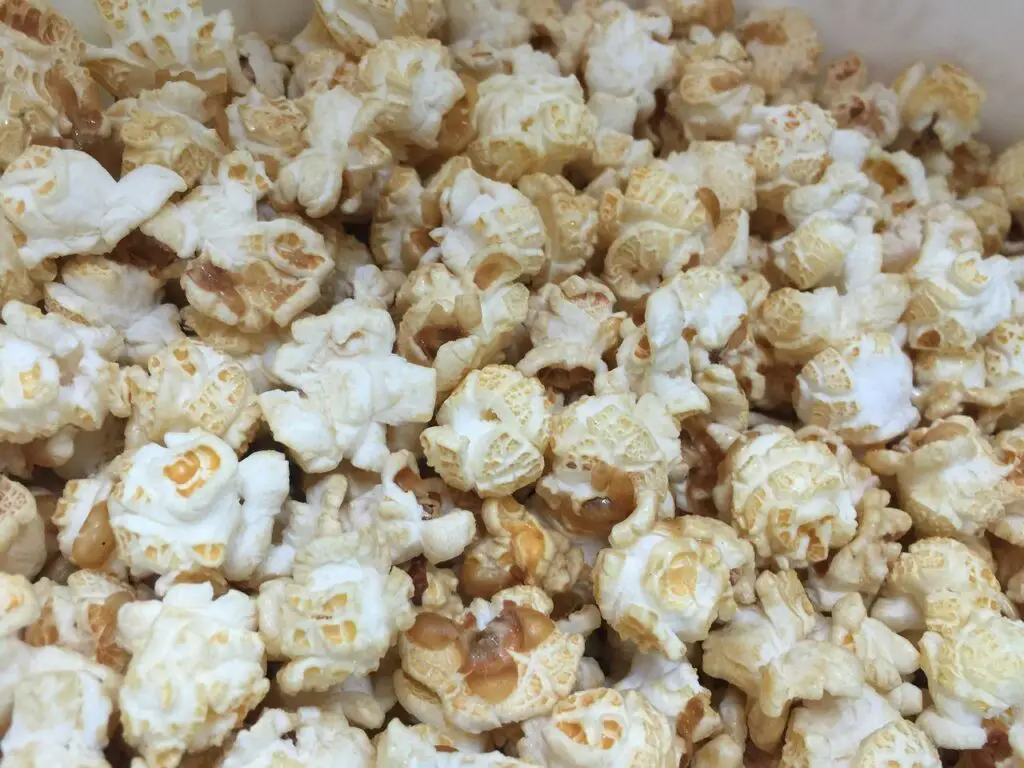It’s movie time, you’ve reclined comfortably on a couch with a warm blanket—a remote on one side and some kettle popcorns beside you, then your favorite furry companion joins in.
As you enjoy kettle popcorn and see those cute eyes staring with desire, how do you resist the urge to share some?
Is kettle popcorn bad for dogs?
No, dogs can have popped kettle corn if plain or prepared with few additives.
The commercial version is flavored with added sugars, artificial sweeteners, and salt unsuitable for your furry friend.
Feeding your dog this kettle popcorn can lead to gastrointestinal issues like abdominal pain and diarrhea.
If you want to share a popcorn treat with your dog, it should be air-popped, plain, and in moderated servings.
Popcorn is a healthy, low-calorie snack enjoyed by most of us.
Does flavored kettle popcorn also fall under this healthy umbrella?
Let’s find out.

Is kettle popcorn healthy for dogs?
This popular snack is loaded with whole grains, fiber, and antioxidants, making them a perfect snack if prepared without excess salt, butter and sugar.
This is a frugal way of adding fiber to your dog’s balanced diet without worrying about calories.
Kettle popcorn is a whole grain filled with B vitamins like thiamin and niacin, promoting canine cell development and energy production.
These B vitamins also regulate hormonal imbalance and improve your dog’s immune and neural functioning.
It also contains traces of minerals like magnesium, potassium, iron, copper, and zinc.
These promote healthy skin, boost cellular functioning, and improve immune systems.
The high dietary fiber in kettle popcorn aids digestion, lowers the risks of obesity, and helps with a good blood flow in the dog’s system.
Kettle popcorns contain increased antioxidants, which boost your dog’s immunity by averting the oxidative damage to body cells caused by free radicals.
This, in return, helps prevent the prevalence of certain chronic diseases like cancers and heart disease.

Why kettle popcorn is bad for dogs
High fats and oils
If taken in large amounts, kettle popcorns have a high-fat content that risks weight gain and other weight-related problems.
When the pancreas becomes inflamed and irritated, it could lead to a life-threatening condition called pancreatitis.
Increased sodium levels
Kettle popcorns are flavored with salt to give them that addictive taste.
This added condiment is highly lethal to dogs leading to sodium poisoning.
Symptoms of sodium poisoning include
- Abdominal pain
- Nausea and vomiting
- Decreased appetite
- Frequent thirst
- Incoordination
- Seizures and tremors
High fiber
Kettle corns are loaded with fiber which has numerous health benefits.
However, fiber has a laxative effect if fed in large amounts.
Thus, it could cause stomach upsets like vomiting and diarrhea instead of relieving digestive issues.
Added sugars
Kettle popcorns contain sugars for that addictive flavor; thus, they are not suitable in large quantities.
The added sugars are complex for your dog to digest, thus, risking weight gain, diabetes, and pancreatitis.
Sugars also increase the chances of tooth decay.
Artificial sweeteners
Some commercial kettle popcorns contain artificial sweeteners (xylitol).
Even in small amounts, xylitol is highly toxic to dogs and can lead to low blood sugar and liver damage.
Peanut butter is also an added ingredient that’s lethal to canines.
Symptoms of xylitol toxicity in dogs include;
- Vomiting
- Diarrhea
- Lethargy
- Collapse
- Kidney and liver damage
Tooth decay
Popcorn kernel hulls get lodged between your dog’s teeth, causing discomfort.
Luckily for humans, we use dental floss to remove them, but for dogs, it can lead to dental issues like tooth decay, bleeding gums, and even gingivitis.
How do you safely feed kettle popcorn to dogs?
Plain: Kettle popcorn is nutrient-dense but only safe for dogs if fed without additives and seasonings. Otherwise, flavored or seasoned kettle popcorn poses a significant danger to canines.
Easy on the portion: Too much of anything is bad. Factor in their daily calorie intake and only offer popcorn as a special treat sparingly.
Air pop: Methods like stovetop, electric popper, and microwave involve popping kernels in oil. This adds to the fats and oils unhealthy for your canine.
Remove the hulls: The size and shape of popcorns present a choking risk, especially the hulls. Pick smaller, hull-less popcorns with tender kernels as a dog snack.
Is kettle corn better than regular popcorn?
Kettle corn contains more calories than regular popcorn due to the added sugars and artificial sweeteners.
It also has oils not suitable for dogs.
These additives are a health risk for canines, especially those with preexisting medical conditions like diabetes.
On the flip side, regular popcorn is unseasoned with few or no additives making it the better option for canines.
It’s fibrous; thus, keeping your pup full longer helps with weight management.
Can dogs be allergic to kettle popcorns?
Yes, corn can be an allergen to dogs like wheat or soy.
An allergic reaction to corn would manifest as vomiting, diarrhea, bloating, excessive paw licking, itchy skin, and hot spots.
If you notice these reactions, your dog is intolerant to kettle popcorns, and you should stop feeding them.
Contact your vet for further guidance.
What should I do if my dog overeats kettle popcorn?
If your furry companion accidentally overeats kettle popcorn, there’s a problem.
However, the severity of the effect depends on the flavor ingested, dog size, and the preexisting medical condition.
Diabetic dogs will have an adverse effect due to the high sugars in kettle popcorns, while large healthy dogs will barely be affected.
First, check for the following symptoms: breathing difficulties, upset stomach, vomiting, diarrhea, and body pains.
The presence of these symptoms requires immediate attention from your vet.
Some dogs may not react right away, but be sure to monitor them closely.
To wrap up
As you marathon on movies, you wouldn’t want your dog to miss out on the popcorn fun.
Plain air-popped popcorns are safe for dogs in moderation.
Although kettle popcorns have additives unsafe for your furry friend, you can easily prepare them at home and control the ingredients for your dog’s health.
Now that you have the details on nutrition and the side effects of kettle popcorns go ahead and pop some for your pup on that family movie night.
- What Dog Breeds Have Pink Skin? - March 24, 2023
- What Are the Most Inspiring Dog Breeding Quotes? - March 20, 2023
- Can Pheromone Spray Help Improve Dog Breeding Results? - March 19, 2023








